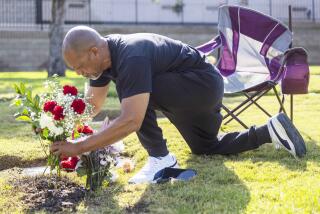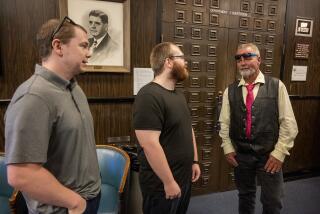Chad MacDonald’s Short, Tragic Life
- Share via
Yorba Linda teenager Chad A. MacDonald Jr., a handsome onetime Little Leaguer, spent the last months of his life playing at the edges, balancing his involvement with illicit drugs against his role as juvenile police snitch.
When the 17-year-old slipped off that edge, the fall was dramatic, resonating far beyond his Orange County neighborhood and leading to broad condemnations of the Brea Police Department’s use of juvenile informants and calls in Sacramento for laws banning the practice.
Before MacDonald fell, before he was tortured and murdered, before his girlfriend was raped and shot and left for dead in the Angeles National Forest, he appeared to be that most typical of suburban youths, a likable jock who cherished his ride--a white 1991 Nissan pickup truck.
But he was also, in the last few months of his life, living at the heart of a net of deceit. He was a runner, a go-between, who used his prized truck for a methamphetamine courier service.
Police reports and interviews with some of the troubled young man’s friends and his family’s attorney indicate that word was out on the streets of Yorba Linda that if you wanted drugs, particularly meth, MacDonald would be a good person to find. The local high school kids knew it. Drug dealers knew it. Even the police knew it.
Which is why, when a Brea traffic cop pulled MacDonald over early Tuesday afternoon, Jan. 6, the officer was interested in more than California vehicle and traffic laws.
“I . . . told MacDonald that his name and vehicle were floating around Yorba Linda as being involved with selling narcotics and asked him if it was true,” the unidentified officer wrote in his report after arresting MacDonald for possession of 10.99 grams of meth. “MacDonald said that he used to be involved in narcotics a long time ago, but he was now straightened out.”
It wasn’t the last lie MacDonald would tell. He would lie to his mother. He would lie to his friends. He would lie to the police who agreed to drop the drug-possession charges if he turned snitch. He would lie to drug dealers.
In the month since MacDonald’s battered and strangled body was found in a South Los Angeles alley, the MacDonald family lawyer and police reports have cast MacDonald as a kid looking to cut deals to save his own skin while continuing to use the meth that got him into trouble in the first place.
In the last week of his life, as word circulated on Yorba Linda streets that he was cooperating with police, MacDonald stayed away from home, holed up in a motel in Norwalk and made regular visits to a ramshackle drug house on nearby Halcourt Avenue.
While the family’s lawyer, Lloyd Charton, insists that MacDonald went to the house to set up one last deal for the cops, police reports show that Brea police had already dropped him as an informant and were moving forward with criminal drug-possession charges against the youth.
The reason: He wouldn’t stop using meth. The habit wouldn’t die until MacDonald did.
In some ways, the mystery of Chad MacDonald lies not in his death, but in his life, and why he stepped so willingly and fully into the world of drugs.
An Active, and Tough, Childhood
Chad Allan MacDonald Jr. was born April 7, 1980, to Chad Allan MacDonald Sr. and Cindy Saroli MacDonald, a Detroit couple who staked their future on a move to Southern California.
The promise of that future was shattered just after 2 a.m. March 5, 1981--a month before the baby’s first birthday--when Chad MacDonald Sr., drunk, ran into a light pole along Imperial Highway in Brea, less than a mile from home. He was killed and MacDonald’s mother was severely injured, left partially disabled and unable to work.
She is “not a well person,” her brother, Chris Saroli, said Friday. “She’s paralyzed in her right arm. . . . You would never know it talking to her, but when she’s put under pressure, she cracks.”
Thirteen months after her husband’s death, Cindy MacDonald married Mark L. Shyken. It was a troubled marriage from the start, and it ended in April 1986, according to court records.
The couple had two sons together. But Shyken’s problems with alcohol and cocaine, which eventually landed him in rehabilitation, led Cindy MacDonald to seek restraining orders against him, in part because he exposed their children to drugs, she charged in court filings.
Shyken, who family members said has turned his life around, did not respond to requests for an interview.
Chad MacDonald, Saroli said, was acutely aware that Shyken wasn’t his father.
“I think it bothered him more than he let on,” Saroli said. “He knew in his heart that he didn’t have a dad. That true bond was missing in Chad’s life.”
Through it all, Cindy MacDonald and her boys remained close to her side of the family, a rambunctious crew known for sloppy kisses and bear hugs, Saroli said.
As a boy, Saroli said, MacDonald was “into everything--soccer, Little League, tennis, whatever.” The MacDonald house became a neighborhood kid magnet.
“They called my sister the Kool-Aid mom,” Saroli said. “She just let them be themselves and they gravitated to her because of that.”
But there was darkness in the home too.
MacDonald was picked up by police a month before his 9th birthday over an unspecified vandalism incident. Police also reported finding him at an underage drinking party in October 1995, when he was 15, records show.
Cindy MacDonald first started noticing changes in her son last summer, around the same time the boy’s grandfather--her father--suffered three heart attacks, Charton said. The grandfather survived, but it all had a profound effect on MacDonald.
“He went into a deep depression,” Charton said. “Reflecting back, [the mother] thinks that’s what caused the depression that led to the drugs.”
Friends, though, said MacDonald was already involved with drugs. They said he began using meth more often last fall. Over the winter, they said, he lost about 20 pounds.
MacDonald Chooses to Cooperate With Police
It didn’t take MacDonald long to decide that the best way to get himself out of the January drug bust was to do a little work for the police.
Police reports say that MacDonald began cooperating as he was being booked, acknowledging that he used and sold meth.
“I will do anything to correct my mistakes,” the reports quote MacDonald as saying, prompting an officer to ask if he would cooperate in identifying the supplier.
The reports say that MacDonald agreed then to work with drug investigators and that his mother signed a permission form when she picked him up. Saroli contends that police took advantage of his sister.
“They forced her to do something she couldn’t even really understand the full consequences of,” he said. “She trusted them and they let her down.”
Over the next week, MacDonald and Brea Police Det. James Griffin spoke several times about setting up a drug buy at a suspected drug house near Esperanza High School in Anaheim. On Jan. 15, after police outfitted MacDonald with a pager hiding a microphone, he bought meth from a woman at the house. Police raided the house a few days later, but no drugs were found and no arrests made.
MacDonald continued to feed information to the police while cutting his own deals on the side, using his arrangement to explain to his mother why he was spending so much time out late, the reports said.
Justin Wright, 18, a former classmate of MacDonald, said in an interview that he was a passenger in MacDonald’s truck around that time and watched MacDonald sell drugs to a walk-up customer in a parking lot.
“We were just sitting there and I looked over and he was counting all of this money,” Wright said. “I was like, ‘Whoa, dude, what’s up with that?’ and he just said something about business being good.”
MacDonald’s balancing act began teetering Feb. 19.
MacDonald appeared in court that day to answer charges relating to the Jan. 6 arrest, a tactic police and prosecutors routinely use to ensure that informants will fulfill their agreements. The hearing was delayed 30 days to give the teen more time to help set up one more buy.
About 7:30 that night, a Brea police officer noticed a white Nissan pickup truck following another car too closely. He pulled the truck over and found MacDonald behind the wheel and in possession of 2 grams of methamphetamines and a small amount of marijuana. MacDonald told the officer that he was trying to find a phone to call Griffin because he had just bought the drugs as an informant.
“MacDonald seemed very nervous and jittery,” the officer wrote.
MacDonald’s handlers told the officer they had no knowledge of the buy, and to arrest him. There, on the side of the road, MacDonald was told that he was done working as an informant. He was released later that night to the custody of his mother.
Teen’s Final Days Spent in Norwalk
MacDonald was now in more trouble than he could know.
Within a few days of the second arrest, MacDonald left home for Norwalk, making daily visits with a male friend to the drug house, Charton said. He mailed a note to his mother saying “he was trying to straighten his life around, he got a job and was going to school,” police records say.
Charton said the friend told him that MacDonald kept saying he needed to “do one more buy.” But the friends were also on a three-day party binge.
“They did massive amounts of drugs during that time,” Charton said.
A familiar face showed up--the woman who earlier sold MacDonald meth, which led to the unsuccessful police raid, Charton said.
She “told all of those gang members that Chad was the little [expletive] who narced on her,” Charton said.
Two people pulled guns as MacDonald furiously denied that he was working with police, Charton said the friend told him.
“They thought they were dead right there,” Charton said. But the confrontation eased under MacDonald’s emphatic denials.
MacDonald returned to the motel early Sunday morning, March 1, and slept through the day. His 16-year-old girlfriend showed up at the hotel on Sunday afternoon and spent the night, Charton said.
MacDonald, accompanied by the girlfriend, went back to the house on Monday to do more drugs, Charton said.
While they were partying, CharFlorence Lela Noriega
ton said, Florence Lela Noriega, 28, walked up to the girlfriend and punched her in the face before turning to MacDonald and calling him a “snitch.” Two men--identified by police as Michael Lucas Martinez, 21, and Jose Alfredo Ibarra, 19--jumped MacDonald and began beating him, Charton said, citing unreleased police reports.
The same morning, the girlfriend’s mother called police to report her daughter missing.
About 24 hours later, a passing Jose Alfredo Ibarra
motorist spotted the girl walking near the San Gabriel Reservoir. She had been raped, shot in the face and left for dead.
That afternoon, Los Angeles County sheriff’s deputies called Cindy MacDonald to tell her about her son’s girlfriend. She hadn’t seen her son for five days, and at the suggestion of deputies filed a missing person’s report, police records show.
As she was filing the report, her son’s body was lying in an alley in South Los Angeles. It would be another day before investigators connected the body with the missing boy from Yorba Linda.
Police asked Cindy MacDonald why she didn’t file the report sooner.
“Mrs. MacDonald said,” the report states, “because this has happened before.”
Troubles Kept From Family Members
For all the love and closeness in Cindy MacDonald’s family, she and her son didn’t share with her siblings and parents the dire straits into which he had fallen.
“They didn’t want me [or my parents] to know about this,” Saroli said.
Saroli said he didn’t spot worrisome changes in his nephew’s behavior.
“I never noticed anything,” said Saroli, of Palm Desert. “He did a good job in keeping it from me. In the past year, I had been really busy in my work, so I didn’t really get there that often. He always said he was going to come out here, but he never did. And when he got his car, well, our time together dwindled.”
Saroli recalled conversations with MacDonald when he was younger, the lectures about saying no to drugs.
“He was always this straight little kid,” Saroli said.
Over the years, Saroli tried to step into an unfillable void in his nephew’s life. He took the boy 30 to 40 times to visit the grave of Chad MacDonald Sr. at Fairhaven Memorial Park in Santa Ana, to look at his own name on a tombstone and ponder the imponderables.
Saroli talked about the father to the son, about how thrilled the father was on the day he was born.
“It was his first baby and it was his son,” Saroli said. “You can’t believe how much he loved that baby.”
And the uncle would tell the nephew about the depth of the love that brought the child into the world.
“I used to walk into the kitchen and [the father would] be sitting in a chair, rubbing Cindy’s feet,” Saroli said. “They wouldn’t even be talking or anything, just sitting there together. They were totally in love. Chad always liked to hear those stories.”
The trips came to be an important part of the relationship between the boy without a father and the uncle. They seemed cathartic, bringing the son close to something he couldn’t touch. Bringing him to a man who had left his life suddenly, and tragically, and let misery enter before the boy was old enough to know what misery was.
“I remember,” Saroli said, “every trip was the same. From the time we walked up to the grave site to the time we left, Chad would not stop crying.”
On March 9, exactly 17 years after his father was buried, Chad MacDonald returned to Fairhaven for the last time, this time to be buried next to the man he never knew, next to the man for whom he cried so many times.
This time, the tears fell for the boy.
Times librarian Sheila A. Kern and Times staff writer Tina Daunt contributed to this story.
More to Read
Sign up for Essential California
The most important California stories and recommendations in your inbox every morning.
You may occasionally receive promotional content from the Los Angeles Times.














